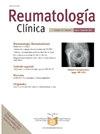类风湿因子升高的纤维肌痛与治疗反应不佳有关,但与发展为类风湿关节炎无关。前瞻性队列研究
IF 1.2
Q4 RHEUMATOLOGY
引用次数: 0
摘要
目的评估类风湿因子(RF)升高的纤维肌痛(FM)患者对治疗的反应以及发展为类风湿关节炎(RA)的情况。样本包括 124 名 FM 患者:62 名 RF 偏高(> 20 U/ml),62 名 RF 偏低(0-20 U/ml)。根据 EULAR/ACR 2010 标准,使用 FM 治疗改善评分(FIQR)对所有患者进行评估,并在 6 个月和 12 个月后评估其是否进展为 RA。结果高RF组的治疗反应较低(6个月和12个月时分别有24名和20名患者好转,而阴性RF组分别有45名和38名患者好转),差异显著。两组患者进展为类风湿性关节炎的情况相似(高RF组5例,阴性RF组4例),但关系不显著。本文章由计算机程序翻译,如有差异,请以英文原文为准。
La fibromialgia con factor reumatoide elevado se asocia a mala respuesta terapéutica pero no con progresión a artritis reumatoide. Estudio de cohortes prospectivo
Objective
Evaluate response to treatment and progression to rheumatoid arthritis (RA) in patients with fibromyalgia (FM) associated with elevated rheumatoid factor (RF).
Material and methods
Prospective cohort study. The sample consisted of 124 patients with FM: 62 with high RF (> 20 U/ml) and 62 with negative RF (0-20 U/ml). All patients were evaluated using FM treatment improvement score (FIQR) and progression to RA according to EULAR/ACR 2010 criteria at 6 and 12 months. Pearson's χ2 test for homogeneity was used to relate variables of improvement to FM treatment and progression to RA.
Results
The response to treatment was lower in the high RF group (24 and 20 patients improved at 6 and 12 months, respectively, compared to 45 and 38 patients in the negative RF group), with a significant difference. Progression to rheumatoid arthritis was similar in both groups (5 in the high RF group and 4 in the negative RF group), with a non-significant relationship.
Conclusions
FM with elevated RF is associated with a poor therapeutic response but not with progression to RA.
求助全文
通过发布文献求助,成功后即可免费获取论文全文。
去求助
来源期刊

Reumatologia Clinica
RHEUMATOLOGY-
CiteScore
2.40
自引率
6.70%
发文量
105
审稿时长
54 days
期刊介绍:
Una gran revista para cubrir eficazmente las necesidades de conocimientos en una patología de etiología, expresividad clínica y tratamiento tan amplios. Además es La Publicación Oficial de la Sociedad Española de Reumatología y del Colegio Mexicano de Reumatología y está incluida en los más prestigiosos índices de referencia en medicina.
 求助内容:
求助内容: 应助结果提醒方式:
应助结果提醒方式:


